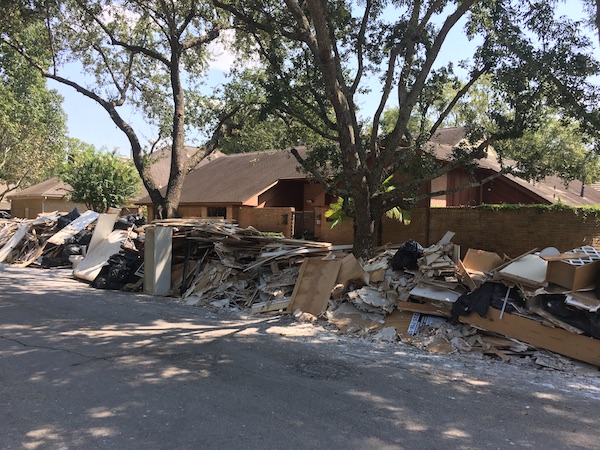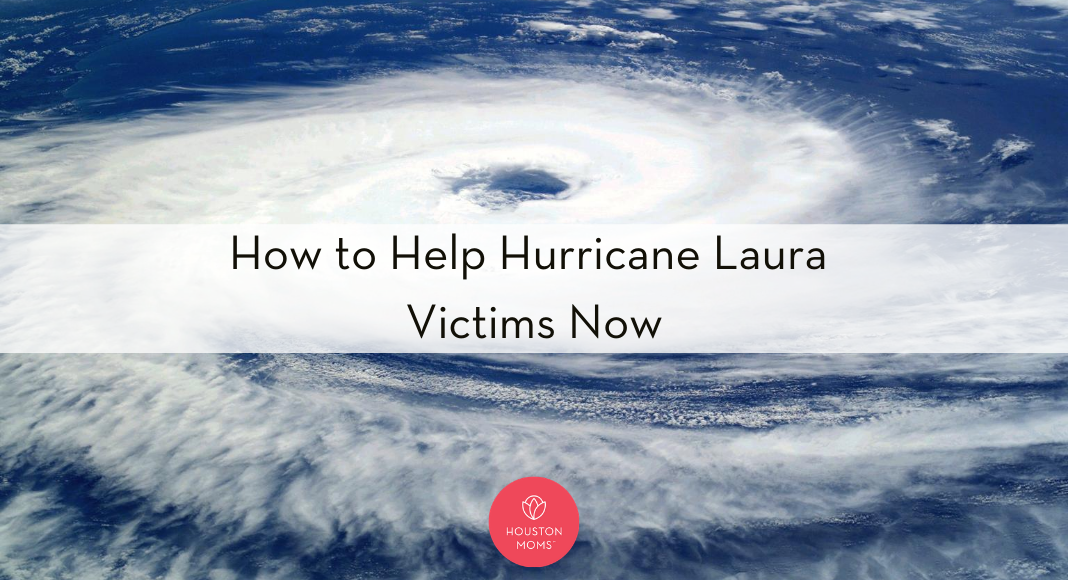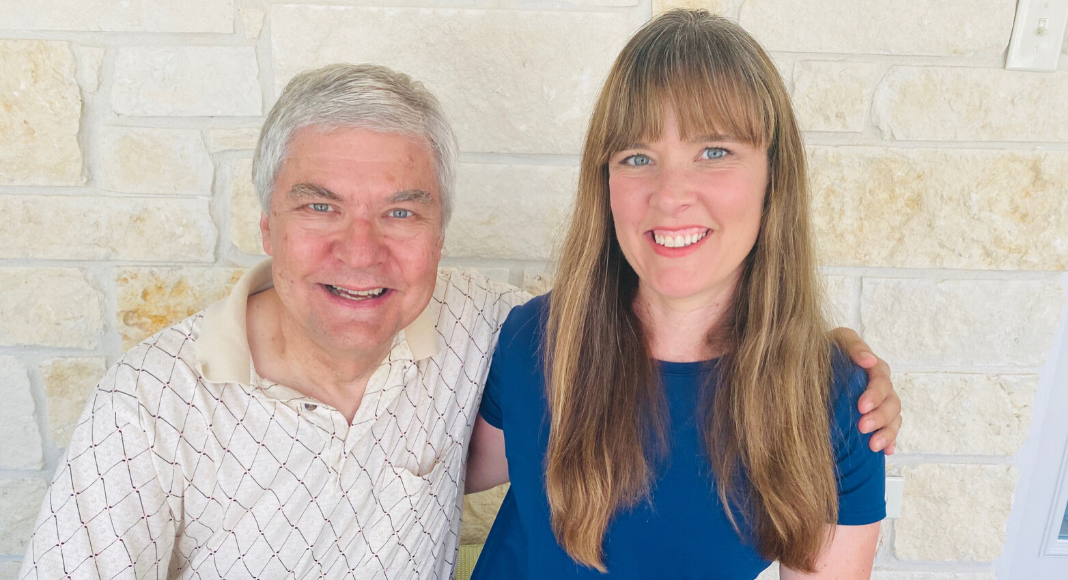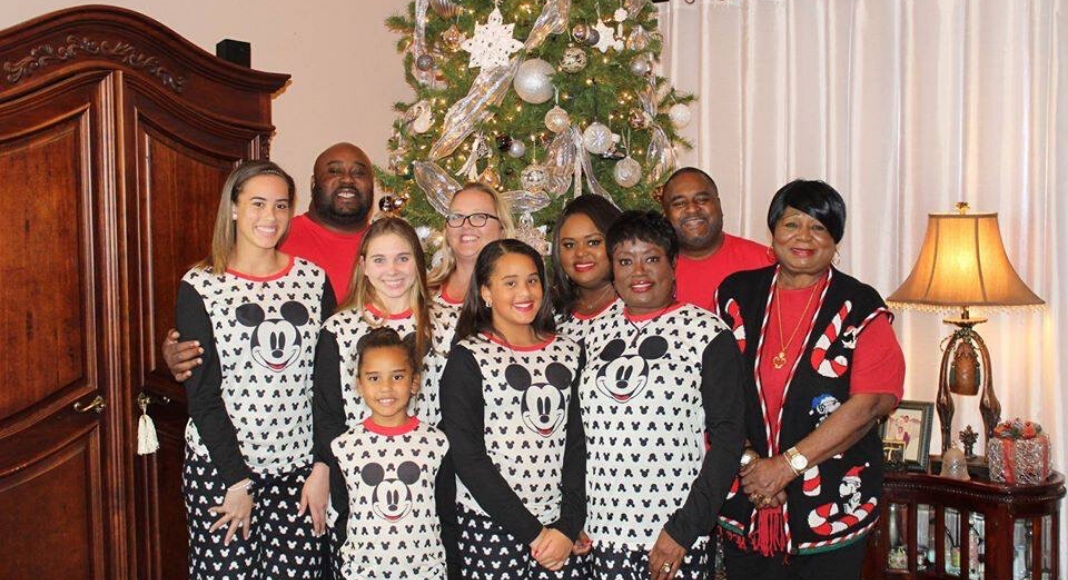Six months have passed since Hurricane Harvey hit, affecting millions of people living in southeast Texas. While much of the Houston area has recovered, the hardest hit areas, such as Meyerland, Kingwood, and West Houston, are still recovering from the devastating effects of the storm. The vast majority of homeowners are still displaced from their flooded homes as they contemplate difficult decisions, await funding, or work to rebuild their home. My family is one of them.
Flooded Families Find Comfort and Support From Each Other
“Why haven’t you moved back in yet?” “What’s taking so long?” “When are you going to get over this?” are all questions my flooded friends and I have been innocently asked by our non-flooded friends and family over the last few months. Truth be told, if I hadn’t experienced Harvey, I wouldn’t be able to comprehend the experiences of a disaster survivor or the lengthy {and stressful} recovery process. Now I have firsthand experience as a natural disaster survivor who is just starting to rebuild after months of weighing our options and waiting for our insurance settlement.
As floodies, we’ve come together as a community through this shared experience to support and encourage each other. Like those who have experienced infertility and pregnancy loss, it’s a club that we never wanted to join, but here we are. bonding in grief, celebrating our progress, sharing information and resources, and advocating for one another. We find strength and comfort in knowing we are not alone and that other people “get it.”
Flooded Families Feel Divison From Their Non-Flooded Family and Friends
Our non-flooded relatives, friends, and neighbors stand by, feeling helpless and guilty for not flooding. They knew how to help us through the crisis, but, six months later, they’re unsure. With the best of intentions, they want to help, but many don’t know how. Those who make efforts to help wonder if they are doing the right thing or if they should do more. They want to be supportive, but they are afraid that they might upset us. They don’t want to disturb or burden us. They don’t want cause us any further pain. For this reason, some may have chosen to take a step back and stop reaching out to their flooded friends.
The unintended result is division amongst friends and neighbors, misunderstandings, and hurt feelings. Some floodies feel they receive more support from non-flooded strangers in community, Facebook groups like “Hurricane Moms Who Need Help,” and local charities, than from their own family and friends. They wonder why their family and close friends are unable to empathize with their situation and have stopped reaching out to offer support.
We Can Come Together and Be #HoustonStrong Again
Flooded or not, we are healing our wounds while fumbling through uncharted waters. So, how do we bring us back together as ONE community, similar to the oneness we demonstrated during and just after Harvey? How do we give each other the gift of grace? With the help of my flooded friends, I’ve compiled a list of “Do’s and Don’ts for supporting your flooded friends after Harvey.” It’s intended to deepen understanding between flooded and non-flooded friends and bring us closer. It’s also intended to help my fellow floodies appreciate how their non-flooded friends feel as they attempt to navigate our emotional minefields and try their best to support us.
As a community, we’ve already lost so much because of Harvey. Let’s not forget that ALL OF US make #HoustonStrong.
How You Can Continue to Offer Emotional Support to Those Who Flooded
Don’t… expect your flooded friends to “get over” what they experienced during Harvey. They are survivors of natural disaster who have lost a huge part of their lives and have a long road of recovery ahead. Many of them have been shaken to their core. They are doing the best they can to process their experience and reclaim their lives… in their own way and according to their own timeline.
Do… remember the words of Dr. Keith Ablow, “Losing one’s home can feel like losing one’s self.” You might not have gone through the same experience, but you can give your friends the grace and the space to recover in their own time with unconditional support from the people around them.
Don’t… minimize your friends’ losses by saying “it’s just a house” or ‘it’s just stuff.”
Do… acknowledge your friends’ losses and how difficult it is to lose their home—a place of security, comfort, and togetherness—and their most precious belongings, many of which cannot be salvaged or replaced. Simply saying “I’m sorry you lost your home and so many things that matter to you” goes a long way.
Don’t… tell your friends “Everything happens for a reason. It’s all going to be ok. God has a plan.” Comments like “You should just be thankful to be alive” or “More good has come out of this than bad” also minimize your friends’ grief and losses. As much as you mean to comfort or encourage your friends with these words, they aren’t always received as such. Your friends can see the goodness around them—and their hearts are full of gratitude, but they don’t necessarily appreciate being the sacrificial lamb.
Do… let your friends know how grateful you are that they are safe and ask them how you can best support them as they recover. “I’m so sorry this happened to you- I am so grateful that you and your family made it through. I know that recovering is a long, stressful process :: what can I do to support you?” Give your friends a pat on the back by saying, “I think you’re handling this situation with such strength, grace, and resilience,” or “You’re doing an amazing job.” If your friends are the praying sort, ask them, “How can I specifically pray for you?”
Don’t…judge the decisions your friends have made about their home. While you might think that they are “foolish” to rebuild, “overreacting” when they decide to sell, or “extravagant” to tear down and build new, your friends are making one of the most difficult decisions they’ve ever had to make. Your friends are weighing numerous different factors, many of which are highly personal. Although they may seem indecisive or frequently changing their minds, they are doing the best they can to reclaim their lives, homes, and finances after this disaster.
Do… say things like “I haven’t been through this experience, but I just want you to know that I’m here to support you,” or “I’m thinking of you. I’m not sure how to help you right now, but I want you to know that I’m here for you.” Let your friends know that you support them no matter what path they choose, and that you respect whatever decision they take.
Don’t… tell your friends that you think they are “lucky” for flooding because they get to remodel and buy new things, that their home will look better than it did before, or that you understand how difficult it is because you went through a kitchen or bath remodel.
Do… keep in mind that your friends are not remodeling by choice. Even when your friends had plans to remodel in the future, they never imagined remodeling under these circumstances. Repairing and rebuilding a home after natural disaster is very different than a planned remodel. Keep an open mind by asking questions like, “Where are you in your road to recovery? What’s been the biggest challenge for you? How can I best support you at this stage?” Listen to how your friends respond, acknowledging how they feel without comparing to your own experiences with remodeling.
Don’t… question or judge your friends for not having flood insurance. They feel horrible enough as it is.
Do… offer to help them research loan options and opportunities for financial aid. Ask if you can help them with their FEMA applications for housing or rental assistance, which requires a mountain of documentation. Share information you’ve found about federal/state/local funding, community block grants, etc. Share discounts, rebates, and other ways to save on repair and rebuilding costs.
Don’t… downplay or underestimate Harvey’s effects on your friends’ children by saying “Your kids are young- they won’t remember this. Kids are so resilient.” Parents with children as young as 2 years old say that their children frequently talk about the storm, the flooding in their homes, and their losses. Parents with school aged and older children report sleep disturbances, nightmares, difficulty concentrating, anxiety, fear of rain, low energy, acting out, and much more. Just like an adult, each child responds in his or her own way to the trauma they’ve experienced, and their feelings deserve to be acknowledged and respected.
Do… ask your friends how their children are doing. Show an interest in their children’s well-being and inquire about their specific needs. Offer to help your friends with childcare so they can focus on their recovery, such as, “Can I pick up your kids after school and bring them home after dinner?” Give {or loan} toys or books to your friends’ children while being respectful of space and noise constraints. If you donate clothes to your friends’ children, pass along gently used items in the appropriate sizes and suitable for the current season. Above all, compliment your friends for being amazing parents through a challenging experience.
Tangible Ways to Support your Flooded Friends
- Stay in touch, even if just a quick text to say, “I’m thinking of you.”
- Acknowledge that friend has a lot of her plate and offer to help in tangible ways, reinforce that you want to support in the months ahead.
- Give her a hug.
- Invite your friends over to your home, especially on weekends or a special occasion.
- Bring a meal, drop off a grocery or meal gift card, ask when you can babysit.
- Offer to help with research, paperwork, errands, or grocery shopping.
- Offer to loan your furniture/household items or replace certain items.
- Offer to help with repairs to damaged photos, laptops, furniture, etc.
Were you flooded in Hurricane Harvey? How are you doing? What are some ways your family and friends could better support you in the months ahead?
About Christina Z
 Christina Z is a West Houston flood survivor and mom to an energetic 5 year old boy. She is passionate about coaching and developing women, and has been helping Memorial area moms recover from Hurricane Harvey by facilitating free support groups. You can read more about Christina at shedreamsbig.com.
Christina Z is a West Houston flood survivor and mom to an energetic 5 year old boy. She is passionate about coaching and developing women, and has been helping Memorial area moms recover from Hurricane Harvey by facilitating free support groups. You can read more about Christina at shedreamsbig.com.

















This captures so much of what I am experiencing as a flood survivor. The recovery process is longer, more emotionally complex, and more isolating than I could have imagined.
To those who have asked us questions posted in this article, to those who have made promises and not kept them, to those whose intention may have been good but resulted in unnecessary costs and additional stress to us, for those who insist we thank God and have ignored us. We are grateful to Jodie with whom we have missed many meals with, Jason and Valerie who “get it” because they like us are “in it.” To The Soto’s who look forward to being across the street from us and to my mom and brothers who are ready to move us home. Imagine yourself being us.